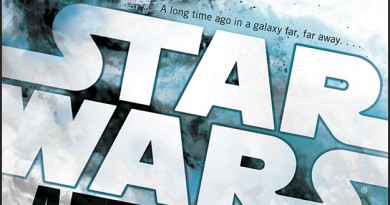Celebrating Five Years For FANgirl With A Website Upgrade
 Five years ago, as a longtime Star Wars fan and avid Expanded Universe reader, I believed the franchise didn’t care about female fans. The internet fandom message board culture was toxic for women. Star Wars adult novels, which had been the source of some of the greatest female characters in science fiction/fantasy, were undermining those characters. Star Wars was contracting, and not simply because the movies had ended, but because a mindset had arisen that certain voices in fandom did not hold valid opinions. Almost all of those voices that fell on deaf ears belonged to women.
Five years ago, as a longtime Star Wars fan and avid Expanded Universe reader, I believed the franchise didn’t care about female fans. The internet fandom message board culture was toxic for women. Star Wars adult novels, which had been the source of some of the greatest female characters in science fiction/fantasy, were undermining those characters. Star Wars was contracting, and not simply because the movies had ended, but because a mindset had arisen that certain voices in fandom did not hold valid opinions. Almost all of those voices that fell on deaf ears belonged to women.
Women were ‘shippers and ‘ficcers. We had unreasonable expectations. Star Wars had been created for boys. These were the things we were told by our own fellow fans and by the powers that be personally.
Rather than walk away from the books and the franchise, I watched female fans of other franchises flourish and find their voices in social media and as masters of their own message as bloggers. They were rebels. These women resisted oppression and hate. They were my new Princess Leia Organa, Padmé Amidala, Mara Jade and Jaina Solo.
In her book Backlash: The Undeclared War Against American Women, Harvard-educated Pulitzer Prize winner Susan Faludi outlined media-driven backlashes against feminist advances in society, and five years ago female geeks had experienced a full-on downslide in the portrayals of women across pop-culture. From comic book covers to fridged female characters, fans had had enough. It is hard, though, to fight entrenched mindsets, especially when pushing back for women results in an onslaught of micro- and macro-aggressions. The hateful attitudes hurled at Anita Sarkeesian and other women on the internet isn’t something new; those of Gamergate’s ilk have just gotten better at it. Examples exist on this blog of fans and even professionals inside Star Wars taking aim at FANgirl, and the irony was not lost at the time that some of the gendered slurs were aimed at our sole male staff member. It became proof that what was happening was seeded in ignorance, and ignorance is something that can be tackled by smart people.
While at times it felt daunting and isolating as a blogger talking about women and Star Wars at the beginning, amazing things were happening. Ashley Eckstein, the voice of Ahsoka Tano, turned her love for fashion into Her Universe. GeekGirlCon brought its message of inclusiveness to fandom. RebelForce Radio decided to give a determined fangirl a chance to talk about why a post called Luke Skywalker Must Die wasn’t about killing our darling, but rather asking for Star Wars to step back up to the table of delivering quality stories that lived up to the promise of Princess Leia in A New Hope. From all these things, I began to understand more and more the power to influence change one fan at a time.
Here at FANgirl, we committed to our vision through content that supported it. A recurring series Fangirls Around the Web found examples of women in fandom, geek attire, and articles with studies and information that debunked the prevailing notions about women and genre. In 1932, Gone With the Wind and The Wizard of Oz, two female-centric stories, topped the box office. Over half of the top box office movies since then have featured female leads or empowered female characters: Snow White and the Seven Dwarfs (1937), 101 Dalmations (1961), The Sound of Music (1965), Star Wars (1977), The Empire Strikes Back (1980), Raiders of the Lost Ark (1981), Return of the Jedi (1983), Jurassic Park (1993), Titanic (1997), The Phantom Menace (1999), and Avatar (2009). While Hollywood seemed to believe that original source material and female creators were sure-fire paths to box office failure, recently J.K. Rowling’s Harry Potter and Suzanne Collins’ Hunger Games, fantasy and science fiction respectively, have proved them wrong. In fact, Harry Potter and its Wizarding World has become the interactive high bar Disney Parks aspires to. Movie-maker blinders aside, women have dominated book sales statistics; fangirls undisputedly had been key to the Expanded Universe’s success from the beginning.
Five years ago, female fans couldn’t imagine walking into Macy’s and buying a Star Wars shirt for women. Convention main rooms didn’t exist for panels discussing the Heroine’s Journey. No one dreamed they could walk into Target and buy a female action figure that wasn’t sexualized and have it ring up as Lead Hero. Despite the fact that numbers like box office statistics don’t lie, it has taken a movement of women empowering themselves, progressing from bloggers to journalists, creators and respected voices, to dispel the myths built up during the years the latest backlash took root.
As the Fangirls Around The Web series was intended to remind anyone who stopped by FANgirl, I have always been a voice among a legion of female fans. Five years has seen so much potential unlocked and new hurdles to overcome. This anniversary became a destination that provided opportunity to reflect and determine where to hone this blog’s focus. As you can see, we have given the place a site upgrade. It was necessary to give all the bloggers who call this home a chance to shine on the front page. While Fangirls Around the Web is being retired, the Heroine’s Journey series has earned its own spot on the front page. She is our workhorse series, earning hundreds of hits from storytelling epicenters like Hollywood, New York City, and even San Francisco each month. Even more exciting is how popular the series is with educators, earning hundreds of hits per week. We see Katniss in The Hunger Games and Rey in The Force Awakens as game changers in storytelling, and FANgirl plans to be there every step of the way.
In the coming weeks we will unveil our new site vision, but first up there will be a FANgirl contingent again this year at GeekGirlCon, October 10-11. The beginning quarter of our next five years is brimming with possibilities: Sarah Michelle Gellar in Star Wars Rebels, Mockingjay Part 2, The Force Awakens!
To Kay, who likely spent more hours than she asked for recompense to spruce up the place, you are a goddess! To everyone who has read FANgirl and supported us, thank you. May the odds forever be in your favor and the Force be with you.
Tricia Barr, Creator/Administator of FANgirl
- Hyperspace Theories: SKELETON CREW Ahoy! - December 29, 2024
- Hyperspace Theories: WICKED Part I Rises to the Moment - December 6, 2024
- Columbia’s Vader™ Collection Launches Dec 5 - November 27, 2024










